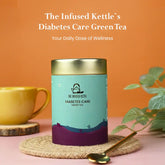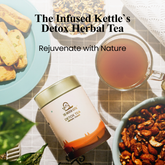Green Tea FAQs
-
Is green tea a fat burner? Does it help with weight loss? How much should I drink? What is the most effective time of day to drink it?
Ans. Green tea is often considered a natural fat burner because it contains catechins (especially EGCG) and a small amount of caffeine, which can boost metabolism and increase fat oxidation. However, it’s not a magic solution—it works best when combined with a healthy diet and regular exercise.
✅ Does it help with weight loss?
Yes, but the effect is modest. Research shows that green tea can increase calorie burning by 3-4%, which can contribute to weight loss over time. It also helps with reducing belly fat when paired with a balanced lifestyle.
✅ How much should you drink daily?
-
2 to 3 cups per day is generally recommended for weight management.
-
This provides enough catechins without causing side effects from excess caffeine.
✅ Best time to drink green tea for weight loss
-
Morning: After breakfast (boosts metabolism and energy).
-
Pre-workout: About 30–45 minutes before exercise (enhances fat burning).
-
Avoid late evening/night: Caffeine can disturb sleep.
⚠️ Tip: Don’t drink on an empty stomach—it can cause acidity. Avoid adding sugar or honey if your goal is weight loss.
-
What are the proven health benefits of green tea?
Ans. Green tea is widely studied for its health benefits, thanks to its rich content of antioxidants, particularly catechins (like EGCG – Epigallocatechin gallate). Here are the proven health benefits of green tea based on research:
✅ 1. Rich in Antioxidants
Green tea contains polyphenols and catechins that help fight free radicals, reducing oxidative stress and lowering the risk of chronic diseases.
✅ 2. Improves Brain Function
-
Contains caffeine (less than coffee), which boosts alertness without causing jitteriness.
-
Includes L-theanine, an amino acid that promotes relaxation and works synergistically with caffeine to improve focus and mood.
✅ 3. Supports Weight Loss
-
Boosts metabolism and fat oxidation due to catechins and caffeine.
-
Research suggests it helps reduce visceral fat and overall body fat when combined with a healthy diet and exercise.
✅ 4. Reduces Risk of Heart Disease
-
Helps lower LDL cholesterol and triglycerides.
-
Improves blood vessel function, reducing the risk of atherosclerosis and cardiovascular issues.
✅ 5. Helps Regulate Blood Sugar
-
May improve insulin sensitivity and reduce blood sugar spikes, making it helpful for people with PCOS or prediabetes.
✅ 6. May Lower Cancer Risk
-
Antioxidants in green tea protect cells from DNA damage.
-
Some studies show reduced risk of breast, prostate, and colorectal cancers, though more research is needed.
✅ 7. Improves Oral Health
-
Catechins inhibit bacterial growth and reduce bad breath.
-
May lower the risk of cavities and gum disease.
✅ 8. Boosts Brain Health & Longevity
-
Regular consumption is associated with a lower risk of neurodegenerative diseases like Alzheimer’s and Parkinson’s.
✅ 9. Supports Liver Health
-
Green tea may help reduce fatty liver disease risk by reducing fat accumulation and inflammation.
.
-
Is it true that by drinking green tea we can lose weight?
Ans. Green tea can support weight loss, but it is not a magic solution. Here’s the breakdown:
✅ How Green Tea Supports Weight Loss
-
Boosts Metabolism
Green tea contains catechins (EGCG) and a small amount of caffeine, which can slightly increase your metabolic rate and fat oxidation. -
Supports Fat Burning
Studies show it may enhance fat burning during exercise and even at rest, especially in the abdominal area. -
Helps Control Appetite
Some people experience reduced appetite, indirectly aiding calorie control.
⚠️ What It Won’t Do
-
It will not cause significant weight loss alone.
-
Results are noticeable only when combined with a healthy diet and exercise.
✅ How Much to Drink
-
2–3 cups per day is enough for most people.
-
Do not overconsume (avoid >6 cups/day) to prevent side effects like insomnia or stomach irritation.
✅ Best Time to Drink
-
Morning (kickstart metabolism).
-
Before workouts (boost fat burning).
-
Between meals (avoid during meals to prevent iron absorption issues).
-
Avoid late night (due to caffeine content).
4. Is green tea good for health?
Ans. Yes, green tea is considered very good for health when consumed in moderation. It is rich in antioxidants (catechins, especially EGCG), which help fight free radicals in the body and support overall well-being.
Key Health Benefits of Green Tea
✔ Boosts metabolism & supports weight management
✔ Improves brain function (due to moderate caffeine and L-theanine)
✔ Lowers risk of heart disease by reducing bad cholesterol (LDL)
✔ Helps regulate blood sugar levels
✔ May lower the risk of some cancers (due to its antioxidant properties)
✔ Promotes better oral health (fights bacteria in the mouth)
Ideal Consumption
-
2–3 cups per day is generally safe and effective.
-
Best time to drink:
✅ Morning (after breakfast)
✅ Before workouts (for energy & fat metabolism)
❌ Avoid on an empty stomach (may cause acidity)
❌ Avoid late evening (caffeine may disturb sleep)
5. What are the benefits and side effects of drinking green tea?
Ans. Green tea has several health benefits, but like any beverage, it also has potential side effects if consumed excessively or in certain conditions. Here’s a detailed breakdown:
✅ Benefits of Drinking Green Tea
-
Rich in Antioxidants
Green tea is loaded with polyphenols and catechins like EGCG, which help fight oxidative stress and prevent cell damage. -
Boosts Metabolism & Aids Weight Loss
It can enhance fat oxidation and slightly increase metabolic rate, supporting weight management. -
Improves Heart Health
Helps reduce LDL cholesterol, blood pressure, and triglycerides, lowering the risk of cardiovascular diseases. -
Supports Brain Function
Contains caffeine and L-theanine, which improve alertness, focus, and mood without causing jitteriness like coffee. -
Regulates Blood Sugar
May help in improving insulin sensitivity and reducing blood sugar spikes. -
May Reduce Cancer Risk
Antioxidants in green tea are linked to a lower risk of certain cancers like breast, prostate, and colorectal. -
Improves Oral Health
Green tea inhibits the growth of bacteria and reduces bad breath.
⚠ Side Effects of Drinking Green Tea
-
Caffeine Sensitivity
May cause insomnia, anxiety, or increased heart rate in caffeine-sensitive individuals. -
Stomach Issues
Drinking on an empty stomach can lead to acidity, nausea, or gastritis. -
Iron Absorption Issues
Green tea tannins can inhibit iron absorption if consumed with meals. -
Headaches or Dizziness
Excess caffeine intake may cause headaches or dizziness. -
Liver Problems (Rare, High Doses)
Very high doses of green tea extract supplements have been linked to liver toxicity.
✅ Safe Consumption
-
Ideal Amount: 2–3 cups per day.
-
Avoid: Drinking on an empty stomach or late at night.
-
Pregnant/Breastfeeding Women: Limit intake (consult a doctor).
5. Is it okay to have green tea on an empty stomach?
Ans. Yes, you can have green tea on an empty stomach, but it comes with pros and cons:
✅ Benefits of Drinking Green Tea on an Empty Stomach
-
Boosts Metabolism Early in the Day
It can slightly increase your metabolic rate, helping in fat oxidation. -
Antioxidant Absorption
Drinking it before meals may help your body absorb catechins and antioxidants better.
⚠️ Possible Side Effects
-
Acidity or Stomach Irritation
Green tea contains tannins, which increase stomach acid and may cause nausea, gas, or discomfort if your stomach is sensitive. -
Mild Caffeine Jitters
Green tea has caffeine (less than coffee), which may cause restlessness or slight dizziness when consumed without food. -
Reduced Iron Absorption
If consumed regularly before meals, it can interfere with non-heme iron absorption from plant-based foods.
✅ Best Practice
-
If your stomach is sensitive, avoid drinking it first thing in the morning.
-
Have it 30–45 minutes after breakfast or between meals.
-
Limit to 2–3 cups a day (about 500–750 ml total).
6. How often should you be drinking green tea in a day?
Ans. The ideal frequency for drinking green tea depends on your health goals and tolerance, but here’s a practical guideline:
✅ Recommended Amount
-
2 to 3 cups per day is generally considered safe and beneficial for most people.
-
This provides antioxidants and metabolism-boosting benefits without overloading on caffeine.
Best Times to Drink Green Tea
-
Morning (but not on an empty stomach, as it can cause acidity).
-
Between meals (helps with digestion and weight management).
-
Before exercise (boosts fat burning and energy levels).
-
Avoid late evening or night, as the caffeine may disturb sleep.
Why Not Too Much?
-
Drinking more than 5 cups a day may lead to side effects like:
-
Acidity or stomach upset (due to tannins).
-
Caffeine-related issues (jitteriness, insomnia).
-
Iron absorption interference (avoid with meals).
✅ Pro Tip: Stick to moderation (2–3 cups), and if your goal is weight loss, combine it with a healthy diet and exercise—it’s not a magic solution but a helpful addition.
7. Does green tea really help reduce belly fat?
Ans. Green tea can help with overall fat reduction, including belly fat, but it’s not a magic solution. Here’s the science and reality:
✅ How It Helps
-
Boosts Metabolism
Green tea contains catechins (EGCG) and a small amount of caffeine, which slightly increase calorie burning and fat oxidation. -
Supports Fat Breakdown
EGCG helps enhance the effect of fat-burning hormones, so your body uses stored fat as energy more efficiently—especially during exercise. -
Improves Insulin Sensitivity
Better blood sugar control can reduce fat storage, particularly in the abdominal area.
❌ What It Does NOT Do
-
It won’t specifically melt belly fat on its own.
-
Drinking green tea without a calorie deficit or exercise will have minimal impact.
✅ What Actually Works
-
2–3 cups of green tea daily, combined with:
-
Balanced diet (high protein, moderate carbs, healthy fats).
-
Regular exercise (especially strength training + cardio).
-
Adequate sleep & stress management (high cortisol = belly fat storage).
🔥 Pro Tip:
Matcha (a powdered form of green tea) has higher catechin content than regular green tea, so it’s slightly more effective for fat metabolism.
8. Which ones are the best green tea brands in India?
Ans. Many tea enthusiasts have shared their experiences, noting that while brands like Lipton and Tetley offer convenience, The Infused Kettle provides a premium, organic, and health-focused tea experience. Customers often mention:
"I've tried various green teas, but the freshness and quality of The Infused Kettle's blends are unmatched."
"The unique flavors, like Hibiscus Green Tea and Rose Green Tea, not only taste great but also support my wellness goals."
🌱 What Sets The Infused Kettle Apart
-
Organic Ingredients: Sourced from pesticide-free gardens, ensuring purity in every cup.
-
Unique Blends: Offering innovative flavors that cater to modern palates.
-
Health Benefits: Designed to support metabolism, skin health, and overall well-being.
🏆 Recognized Among Top Green Tea Brands in India
While brands like Lipton, Tetley, and Organic India are popular choices, The Infused Kettle has garnered attention for its commitment to quality and health benefits. According to a list by LBB:
"The Infused Kettle stands out for its unique blends and health-focused approach."
9. Which is the best time to drink green tea?
Ans. The best time to drink green tea depends on your goal and tolerance, but here are the most recommended times:
✅ 1. Morning (After Breakfast)
-
Drinking green tea on an empty stomach can cause nausea or acidity due to tannins.
-
Best to drink 30–45 minutes after breakfast for an energy boost and metabolism kick-start.
✅ 2. Before Exercise
-
Drinking green tea 30–45 minutes before a workout can help boost fat oxidation and improve endurance because of its caffeine + catechins combo.
✅ 3. Between Meals
-
Having it between meals (mid-morning or mid-afternoon) aids digestion and prevents hunger pangs.
-
Avoid drinking it with meals because tannins can hinder iron absorption.
❌ Avoid at Night
-
Green tea contains caffeine (less than coffee but enough to affect sleep).
-
Avoid drinking after 6 PM if you are sensitive to caffeine.
✅ Ideal frequency: 2–3 cups daily for health benefits without side effects.
10. Is green tea really effective or not?
Ans. Green tea is effective, but its impact depends on how you use it and what you expect. Here’s the breakdown:
✅ What Green Tea Actually Does
-
Boosts Metabolism Slightly
-
Catechins (EGCG) and caffeine in green tea can increase calorie burn by 3–4% per day, which is modest but helpful long-term.
-
Aids Fat Oxidation
-
When combined with exercise, it improves the body’s ability to burn fat for energy.
-
Helps with Appetite Control
-
Drinking it between meals can reduce cravings, making it easier to stick to a calorie deficit.
-
Rich in Antioxidants
-
Supports overall health by reducing oxidative stress and inflammation.
❌ What It Won’t Do
-
It won’t melt belly fat on its own.
-
If your diet is high-calorie or sedentary lifestyle continues, results will be minimal.
-
Weight loss requires a calorie deficit — green tea is just a support tool, not a magic solution.
✅ When It Works Best
-
When combined with balanced diet + regular exercise.
-
As a replacement for sugary drinks (reduces overall calorie intake).
11. Which is best type of green tea?
Ans. The best type of green tea depends on your health goals, taste preference, and quality. Here are the top types and what makes them good:
✅ 1. Matcha Green Tea
-
What it is: Finely powdered green tea leaves from Japan.
-
Benefits:
-
Extremely high in antioxidants (especially EGCG).
-
Boosts metabolism and fat burning.
-
Provides sustained energy and focus because of L-theanine + caffeine combo.
-
Best for: Weight loss, detox, and energy.
-
Taste: Rich, creamy, slightly bitter.
-
How to drink: Whisk the powder in hot water or make a latte.
✅ 2. Sencha
-
What it is: Most common Japanese green tea.
-
Benefits:
-
Packed with antioxidants and catechins.
-
Good for overall health and immunity.
-
Taste: Fresh, grassy, slightly sweet.
-
Best for: Daily health, digestion, and metabolism.
✅ 3. Gyokuro
-
What it is: Premium Japanese shade-grown green tea.
-
Benefits:
-
High in chlorophyll and amino acids.
-
Provides calm alertness.
-
Taste: Sweet and umami-rich.
-
Best for: People who want a premium, antioxidant-rich tea.
✅ 4. Jasmine Green Tea
-
What it is: Green tea scented with jasmine flowers.
-
Benefits:
-
Rich in antioxidants.
-
Has a calming effect and reduces stress.
-
Taste: Floral and delicate.
-
Best for: Relaxation and improving mood.
✅ 5. Darjeeling Green Tea (India)
-
What it is: Grown in Darjeeling, India.
-
Benefits:
-
Good for digestion.
-
A milder option compared to Japanese teas.
-
Taste: Light, floral, and fruity.
-
Best for: Beginners and those who like a light taste.
If your goal is Weight Loss → Matcha or Sencha
If your goal is Relaxation → Jasmine Green Tea
If you want an Indian option → Darjeeling Green Tea
12. What is the best brand of green tea?
Ans. Looking for the best green tea? Your search ends here.
Our green tea isn’t just a beverage; it’s a lifestyle choice trusted by thousands of health-conscious individuals. Sourced from organic tea gardens, every leaf is handpicked to ensure premium quality, rich antioxidants, and authentic flavor.
✔ 100% Organic & Natural
✔ Packed with antioxidants for better metabolism
✔ Trusted by wellness experts and loved by tea lovers
When you choose Infused Kettle, you’re choosing purity, health, and the ultimate green tea experience. Make the switch today and sip your way to a healthier life!
13. What happens if I drink green tea daily?
Ans. Drinking green tea daily can have several positive effects on your health, as well as some things to watch out for if consumed in excess. Here’s a clear breakdown:
✅ Benefits of Drinking Green Tea Daily
-
Boosts Metabolism & Aids Weight Management
Green tea contains catechins and caffeine, which can help boost fat oxidation and improve metabolism. -
Rich in Antioxidants
It’s packed with powerful antioxidants like EGCG (Epigallocatechin gallate) that fight free radicals, reduce inflammation, and protect cells from damage. -
Supports Heart Health
Daily consumption may lower LDL cholesterol and improve blood flow, reducing the risk of cardiovascular issues. -
Enhances Brain Function
Contains caffeine (mild stimulant) and L-theanine, improving focus, alertness, and cognitive performance. -
Promotes Healthy Skin
Antioxidants help combat skin aging and improve overall skin health.
⚠ Possible Side Effects (If Overconsumed)
-
Stomach irritation (if consumed on an empty stomach)
-
Mild insomnia or anxiety (due to caffeine)
-
Iron absorption interference (drink it between meals, not with meals)
✅ Ideal Intake: 2–3 cups per day is generally considered safe and effective for health benefits.
13. How much caffeine does green tea contain?
Ans. Green tea naturally contains caffeine, but much less than coffee. On average:
-
One cup (240 ml) of brewed green tea has about 25–40 mg of caffeine.
-
For comparison, a regular cup of coffee can have 95–120 mg of caffeine.
The exact caffeine amount can vary depending on:
-
Type of green tea (like matcha, sencha, or Darjeeling)
-
Brewing time and temperature (longer steeping = more caffeine)
-
Brand and leaf quality
At The Infused Kettle, our green teas like Hibiscus Green Tea, Rose Green Tea, and Purple Cranberry Green Tea are crafted to give a gentle caffeine boost while focusing on wellness, antioxidants, and holistic health—perfect for daily enjoyment without overloading on caffeine.
14. Which one is better, Lipton green tea, Tetley green tea or Infused Kettle?
Ans. Many tea lovers who have tried Lipton Green Tea or Tetley Green Tea often notice that Infused Kettle stands out in terms of freshness, taste, and health benefits. Unlike mass-produced teas, Infused Kettle uses premium, organic ingredients blended carefully to enhance both flavor and wellness.
While some popular brands offer convenience, their teas can sometimes taste bland or lack the authentic aroma of natural herbs. Infused Kettle’s range—including Hibiscus Green Tea, Rose Green Tea, and Purple Cranberry Green Tea—provides a refreshing cup that also supports wellness, with benefits like antioxidants, stress relief, and improved digestion.
Switching to Infused Kettle can bring a noticeable difference in energy and overall wellness. It’s not just tea—it’s a mindful ritual that combines flavor, quality, and health in every cup.
Is drinking green tea before going to bed good for health?
Ans. Drinking green tea before bed can be a bit tricky. Many tea lovers enjoy its soothing effects, but since green tea contains caffeine, it might interfere with sleep if consumed too late. That said, some people do find that a small cup of decaffeinated or mild green tea, like Chamomile Green Tea or Relaxing Green Tea from The Infused Kettle, can actually help calm the mind and aid relaxation before bedtime.
From a health perspective, green tea before sleep still offers antioxidants and metabolism benefits, but it’s best to keep it 1–2 hours before sleeping to avoid restlessness. For those sensitive to caffeine, opting for herbal or floral blends from The Infused Kettle is a safer choice to enjoy a cozy, healthy bedtime ritual.
Is green tea the healthiest tea for the skin?
Ans. Yes! Green tea is widely celebrated for its skin-boosting benefits, and many of our customers at The Infused Kettle swear by it. Packed with antioxidants like catechins, it helps fight free radicals, reduce inflammation, and promote a healthy, glowing complexion. Regularly sipping blends like Hibiscus Green Tea, Rose Green Tea, or Purple Cranberry Green Tea not only hydrates the skin but also supports detoxification from within.
While green tea is amazing, pairing it with a balanced lifestyle and proper hydration maximizes its effects. Many Infused Kettle fans say their skin feels fresher and more radiant after making these teas a part of their daily routine—so it’s not just healthy, it’s a natural beauty booster in a cup.
What's the difference between green tea and normal tea?
Ans. The difference mainly comes down to how the leaves are processed and what benefits they offer.
Normal tea, like the typical black tea or masala chai, is fully oxidized, giving it a stronger flavor, darker color, and higher caffeine content. It’s energizing but doesn’t have as many antioxidants as green tea.
Green tea, like the ones from The Infused Kettle—such as Hibiscus Green Tea, Rose Green Tea, or Purple Cranberry Green Tea—is minimally processed, which preserves its natural antioxidants, vitamins, and polyphenols. This means it’s great for overall health, immunity, metabolism, and even skin health, while still giving a light, refreshing taste.
In short: normal tea wakes you up, green tea nourishes you—and with Infused Kettle’s premium blends, you get both flavor and wellness in every cup.
- Choosing a selection results in a full page refresh.







